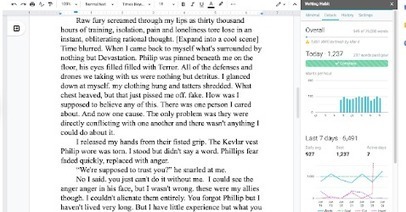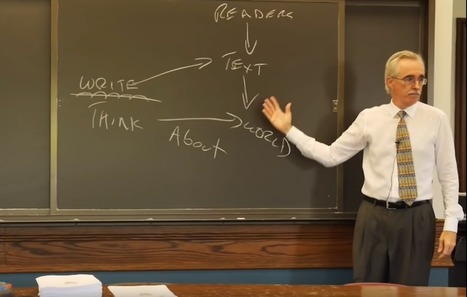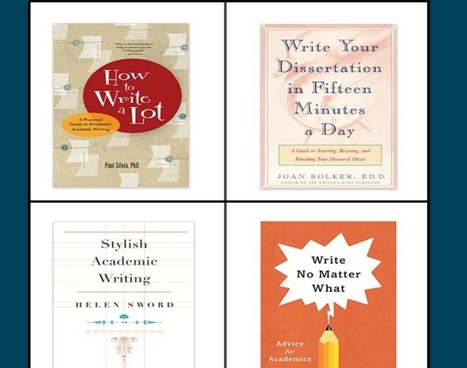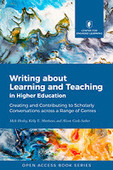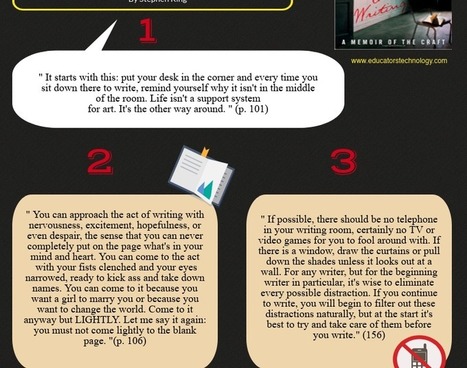 Your new post is loading...
 Your new post is loading...
Writing Habit is a Google Docs add-on to help you with your writing. The basic philosophy behind the app is to help users build writing habits through achieving daily/weekly writing goals. It does so by tracking your daily word count and offers you suggestions for improvement.
Academic writing has a bad reputation. “When a scholar’s vanity/insecurity leads him to write primarily to communicate and reinforce his own status as an Intellectual,” as David Foster Wallace diagnosed the problem nearly two decades ago, “his English is deformed by pleonasm and pretentious diction (whose function is to signal the writer’s erudition) and by opaque abstraction (whose function is to keep anybody from pinning the writer down to a definite assertion that can maybe be refuted or shown to be silly).” Indeed. But the disorders behind the kind of prose that inspires provocations like Philosophy and Literature‘s “Bad Writing Contest” are, if you believe University of Chicago Writing Programs director Larry McEnerney, even more basic than that.
Popular writing should be as rigorous as scholarship — but much easier to read
Via Ana Cristina Pratas
The theme of this week’s book collection is academic writing and to this end I curated for you this useful list. I am principally addressing research students and academics but the insights and tips from these books are also relevant to anyone keen on improving their writing style. As a research student, you get to do a lot of writing and usually across different genres, from a literature review to writing a research grant proposal. Each of these writing projects call for a specific set of skills and involve different practices and stylistics (in the popular sense of the word not the linguistic one).And because nobody of us is born a good writer, it takes so much practice to better your writing style and even much more practice when it comes to academic writing. However, what I am talking about here is guided practice, one that draws on established guidelines and norms. In other words, if you want to learn how to write better you need to learn it from people who master the craft.
Analysis rhymes with paralysis, I have discovered: Too often in the past, the texts I asked my freshman English students to analyze left them frozen, detached from their own thoughts and feelings. They scratched at the surface of literature that was not particularly meaningful or accessible to them. The result was cold, inauthentic writing, and I dreaded teaching analysis. But last summer I read Allison Marchetti and Rebekah O'Dell’s book Beyond Literary Analysis and decided to use their approach. Marchetti and O’Dell uncouple the task of analysis from traditional literary texts and instead invite students to delve into a broader definition of text: “anything that has a beginning, middle, and end and can be broken down into smaller pieces and studied.”
Education plays a significant role in everyone’s lives. It helps in the growth of personality and transforming identity. Not to mention, but most of us have spent our childhood at school. During this time, we did/do many things that directly affect our lives and have been important for us in the long. Although at times, we fail to recognize its relevance, in some way or the other, they affect our lives. In our life, academic learning is one such thing that contributes a lot to make us a complete human being. Good qualities and habits get developed during this stage of life and stay with us forever. The major part of this academic life revolves around classrooms, lectures and other extra-curricular activities. Also, during this academic stage, we have to go through various grading and assessment processes, which make us confident and enhance our perseverance. For instance, academic writing is an integral part of the school module and often carries a significant amount of marks for students. Academic writing is a tedious process, and most of us write different assignments and projects just to achieve better marks. These grades play a vital role in building up our career and are crucial enough in positioning us as a scholar.
LibParlor Contributor, Allison Hosier, discusses how writing an abstract first can help clarify what you’re currently talking about.
Allison Hosier is an given information Literacy Librarian during the University at Albany, SUNY. She has published and presented on research related to practical applications of the ACRL Framework for Information Literacy as part of information literacy instruction. Her research that is current is on examining the metaconcept that scientific studies are both an action and a topic of study. Follow her on Twitter at @ahosier.
In 2012, I attended a few workshops for brand new faculty on how to write very first peer-reviewed article, step-by-step. These workshops were loosely based on Writing Your Journal Article in 12 Weeks by Wendy Laura Belcher.
Our first assignment? Write the abstract for the article.
Many academics use the summer holidays as a time to relax, unwind and finally get that writing project done. However, is setting aside large chunks of time over the holidays the best way to approach academic writing? Chris Smith argues that writing over the holidays can be effective, but should be approached thoughtfully. Whereas, the holidays may seem to present a large spell of unbroken time in which to write, the way in which you approach and manage this time is just as important as its duration.
Academic writing at any stage of an academic career can be one of the most challenging aspects of the role. There will be many times that as academics we experience the dreaded writer’s block and struggle to get words on the page. Here are some tips I have developed over the 11 years I have worked in academia which I
have found helpful for helping overcome this issue. However, it is important to note that what works for me, will not necessarily
work for you. Find your tools and add them to your toolkit after you have found them to be useful, and equally, discard the ones
which don’t work for you.
Science, engineering and other STEM (science, engineering, technology and math) students often don’t realise the importance of writing well, as they believe writing skills are for the humanities or liberal arts majors.
Many education systems around the world tend to categorise students or place labels on them, based on their interests and talents.
There are even education ‘streams’ in certain countries where high school students are grouped based on these differences, such as ‘arts’ streams that teach accounting, economics and art, while ‘science’ stream students learn physics, chemistry and biology.
Start writing, no matter what. The water does not flow until the faucet is turned on.”
— Louis L’Amour
When I first heard the instruction to write every day, I felt stress. I wasn’t sure what on earth I could possibly have to say that would need me to be saying it daily. As time went on and I learned more, got more conscious of success and developed my business mindset, I started finding it impossible to not write daily. Whether I’m working on an ebook or fiction, a blog post, status update or business journal entry, I am now always recording something. So, how can you implement this in your life as a content creator, especially if you are just starting out? Read on to find out.
Writing satisfaction is strongly linked to publishing productivity and, potentially, career success. Chris Smith reports on research investigating the tools and systems academics from all career stages use to keep writing and publishing. Age, experience, and having a sense of certainty about what sort of writing system suits you and your life are all important to productivity and overall satisfaction. Early-career researchers may struggle with external pressures and barriers such as procrastination or feeling overwhelmed which cause most dissatisfaction, but these feelings do slowly ebb away. The more experience you gain, the more likely you’ll have found a writing system that works, and the more productive, satisfied – and hopefully successful – you’ll be.
…and for any kind of persuasive writing.
Sure, great writing may take talent and innate creativity. And hey, you’ve got something to say, right? No matter your current level of experience or skills. With a little gusto in your writing step, you can make the reader feel something, take an action, or be more informed than before.
A few tips below to show you how.
|
Choosing something that you are passionately interested in to research is a great first step on the road to successful academic writing but it can be difficult to keep the momentum going. Deborah Lupton explains how old-fashioned whiteboards and online networking go hand-in-hand, and offers advice for when it is time to just ‘make a start’ or go for a bike ride.
As part of preparing for a workshop on academic publishing for early career academics, I jotted down some ideas and tips to share with the group which I thought I would post here. In the process of writing 12 books and over 110 peer-reviewed journal articles and book chapters over a career which has mostly been part-time because of juggling the demands of motherhood with academic work, I have developed some approaches that seem to work well for me.
There is a new free book Writing about Learning and Teaching in Higher Education which can be downloaded in pdf free, or you will be able to buy a print copy online.
Healey, M., Matthews, K., and Cook-Sather, A. (2020). Writing about Learning and Teaching in Higher Education: Creating and Contributing to Scholarly Conversations across a Range of Genres. Elon University. Open access PDF https://doi.org/10.36284/celelon.oa3 ISBN: 978-1-951414-04-7
Print edition ISBN: 978-1-951414-05-4 $22.95
Details and the online book: https://www.centerforengagedlearning.org/books/writing-about-learning/
In today's post I am revisiting this visual we published in the past which features some important tips to help you become a better writer. These tips are collected from Stephen King's book ‘On Writing: A Memoire of The Craft’ (contains Amazon affiliate link). They (tips) are less about writing mechanics and more about developing a writer's mindset. Stephen King's nuggets of wisdom are a culmination of his writing career which has spanned more than 2 decades and has resulted in numerous prestigious awards and blockbuster fiction publications.
Where do you go when you want to learn about new EdTech tools? From checking out new blog posts (like this one!) to searching hashtags on social media, there are lots of ways to learn about new EdTech tools. When I attend a conference, I also stay on the lookout for companies that have just come on the scene. This way, I can connect with them, ask them questions, and see if their booth is “buzzing” with excitement from other educators, too.
While I have a couple of blog posts pending (both by request, on how to prepare for comprehensive exams and how to build a research trajectory and a project pipeline for early career scholars), I wanted to write a post on something that I get asked about quite frequently. I arrived to the daily writing routine quite naturally, because I love stationery and more generally, I adore writing. But I always get asked “how do I build a good writing routine?”
Academic writing is a difficult and creative undertaking and advice to authors can often be to follow a single method or to copy the approaches of other academics. In this post Chris Smith draws on his years of experience working as an academic writing coach, to provide 10 counter-intuitive insights to help you understand and improve your own writing practice.
As a writing coach I sometimes find myself giving the same pointers and tips again and again. Over the years, I’ve grown accustomed to the raised eyebrows these tips can generate. They seem unconventional and counter intuitive. They’re often not received academic wisdom.
Most graduate writers who are struggling with their writing are actually struggling with their thinking. It isn’t a psychological block, but rather the intellectual confusions endemic to the process of communicating sophisticated research. To Rachael Cayley, these confusions are real and can have deleterious consequences for writing, but when we treat these problems as conceptual problems in our thinking we create the space to use writing as a strategy to solve them. The writer’s block label may just be further alienating us from our own writing; write your way out.
Key takeaways - Explicitly teach writing. Don’t just assign writing tasks and hope for the best. Instead, break writing instruction down into manageable chunks for students to tackle using deliberate practice activities.
- Teach students how to write great sentences. Sentences are the building blocks of excellent writing, so writing instruction needs to give students plenty of practice at sentence-level writing
- Embed writing into the teaching of content. Don’t see this as another thing to teach on top of content; instead, use writing instruction to deepen students’ engagement with what they’re learning.
- Teach grammar as you teach writing. Stifle the yawn and let your students in on the secrets of excellent writing, this includes teaching the proper structure and function of great sentences while they write.
Knowing how to write is an essential skill. Constructing written work that effectively explains, informs or persuades helps students succeed in school, and later in their working lives. People spend a lot of time at work using network tools that require them to write. Email, social media and text messaging mean that whatever path students choose in life, their ability to communicate thoughts and ideas effectively in writing sets them up to thrive. Unfortunately, schools don’t always teach writing very well. Teachers often ask students to complete a lot of writing but less frequently carve out instructional time to explicitly teach students how to build effective sentences and combine these sentences into effective paragraphs and essays. Thankfully, Judith Hochman and Natalie Wexler have a book that tells you exactly how to teach your students to be better writers. The Writing Revolution: A Guide to Advancing Thinking Through Writing in All Subjects and Grades provides a comprehensive school-wide framework for developing better writers and is jam-packed full of classroom-ready activities and strategies.
WriteBetter is a learning tool for written English that leverages the Data-Driven Learning (DDL) approach. DDL refers to an approach to learning foreign languages in which students discover patterns or rules of language use autonomously by exploring a large amount of sentences written by native speakers.
Millie Jones and Christy Fraenza, Lead Writing & Learning Specialists with the Ashford Writing Center, discussed paraphrasing on an episode of Write On. Listen to their advice on paraphrasing here, and get the class notes below.
Learnhigher is a network for promoting and facilitating the development and dissemination of high quality, peer-reviewed resources for learning development in the higher education sector. We aim to support the development of such resources as well as conduct and disseminate research into the use and effectiveness of learning development strategies and materials.
How to write an essay
This is a lecture aimed at first-year undergraduates, on basic essay-writing skills. It's public and re-usable so feel free to download and adapt. If you do find it useful, do leave me a comment!
|

 Your new post is loading...
Your new post is loading...
 Your new post is loading...
Your new post is loading...




